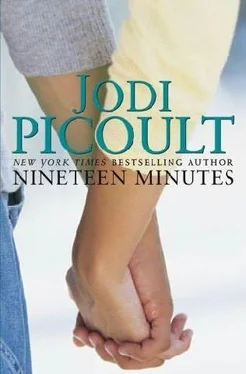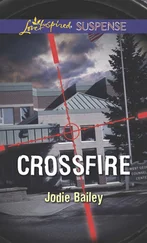King had won the case for them. In the years that had passed, he’d become one of the foremost experts on battered woman syndrome, and appeared routinely as a witness for the defense all over the country. His fees had skyrocketed; his time now came at a premium.
Jordan headed to King’s Boston office without an appointment, figuring his charm could get him past whatever secretarial gatekeeper the good doctor employed, but he hadn’t counted on a near-retirement-age dragon named Ruth. “The doctor’s booking six months out,” she said, not even bothering to look up at Jordan.
“But this is a personal call, not a professional one.”
“And I care,” Ruth said, in a tone that clearly suggested she didn’t.
Jordan figured it wouldn’t do any good to tell Ruth she was looking lovely today, or to grace her with a dumb-blonde joke, or even to play up his successful track record as a defense attorney. “It’s a family emergency,” he said.
“Your family is having a psychological emergency,” Ruth repeated flatly.
“Our family,” Jordan improvised. “I’m Dr. Wah’s brother.” When Ruth just stared at him, Jordan added, “Dr. Wah’s adopted brother.”
She raised one sharp eyebrow and pressed a button on her phone. A moment later, it rang. “Doctor,” she said. “A man who claims to be your brother is here to see you.” She hung up the receiver. “He says you can go right in.”
Jordan opened the heavy mahogany door to find King eating a sandwich, his feet crossed on top of his desk. “Jordan McAfee,” he said, smiling. “I should have known. So tell me…how’s Mom doing?”
“How the hell should I know, she always loved you best,” Jordan joked, and he came forward to shake King’s hand. “Thanks for seeing me.”
“I had to find out who had enough chutzpah to say he was my brother.”
“‘Chutzpah,’” Jordan repeated. “You learn that in Chinese school?”
“Yeah, Yiddish came right after Abacus 101.” He gestured for Jordan to take a seat. “So how’s it going?”
“Good,” Jordan said. “I mean, maybe not as good as it’s going for you. I can’t turn on Court TV without seeing your face on the screen.”
“It’s been busy, that’s for sure. I’ve only got ten minutes, in fact, before my next appointment.”
“I know. That’s why I took a chance that you’d see me-I want you to evaluate my client.”
“Jordan, man, you know I would, but I’m booking nearly six months out for trial work.”
“This one’s different, King. It’s multiple murder charges.”
“Murders?” King said. “How many husbands did she kill?”
“None, and it’s not a she. It’s a boy. A kid. He was bullied for years, and then turned around and shot up Sterling High School.”
King handed half of his tuna sandwich to Jordan. “All right, little brother,” he said. “Let’s talk over lunch.”
Josie glanced from the serviceable gray tile floor to the cinder-block walls, from the iron bars that isolated Dispatch from the sitting area to the heavy door with its automatic lock. It was kind of like a jail, and she wondered if the policemen inside ever thought about that irony. But then, as soon as the image of jail popped into her head, Josie thought of Peter and began to panic again. “I don’t want to be here,” she said, turning to her mother.
“I know.”
“Why does he even want to talk to me again? I already told him I can’t remember anything.”
They had received the letter in the mail; Detective Ducharme had “a few more questions” to ask her. To Josie, that meant he must know something now that he hadn’t known the first time he questioned her. Her mother had explained that a second interview was just a way of making sure the prosecution had dotted their i’s and crossed their t’s; that it really didn’t mean anything at all, but that she had to go to the station, all the same. God forbid Josie be the one to screw up the investigation.
“All you have to do is tell him, again, that you don’t remember anything…and you’ll be all done,” her mother said, and she gently put her hand on Josie’s knee, which had begun shaking.
What Josie wanted to do was stand up, burst through the double doors of the police station, and start running. She wanted to sprint through the parking lot and across the street, over the middle school playing fields and into the woods that edged the town pond, up the mountains that she could sometimes see from her bedroom window if the leaves had fallen from the trees, until she was as high as she could possibly go. And then…
And then maybe she’d just spread her arms and step off the edge of the world.
What if this was all a setup?
What if Detective Ducharme already knew…everything?
“Josie,” a voice said. “Thanks so much for coming down here.”
She glanced up to see the detective standing in front of them. Her mother got to her feet. Josie tried, honestly she did, but she couldn’t find the courage to do it.
“Judge, I appreciate you bringing your daughter down here.”
“Josie’s very upset,” her mother said. “She still can’t remember anything about that day.”
“I need to hear that from Josie herself.” The detective knelt so that he could look into her eyes. He had, Josie realized, nice eyes. A little sad, like a basset hound’s. It made her wonder what it would be like to hear all these stories from the wounded and the stunned; if you couldn’t help but absorb them by osmosis. “I promise,” he said gently. “This won’t take long.”
Josie started to imagine what it would feel like when the door to the conference room closed; how questions could build up like the pressure inside a champagne bottle. She wondered what hurt more: not remembering what had happened, no matter how hard you tried to will it to the front of your mind, or recalling every last, awful moment.
Out of the corner of her eye, Josie saw her mother sit back down. “Aren’t you coming in with me?”
The last time the detective had talked to her, her mother had pulled the same excuse-she was the judge, she couldn’t possibly sit in on the police interview. But then they’d had that conversation after the arraignment; her mother had gone out of her way to let Josie know that acting like a judge on this case would not be mutually exclusive to acting like a mother. Or in other words: Josie had been stupid enough to think that things between them might have started to change.
Her mother’s mouth opened and closed, like a fish out of water. Did I make you uncomfortable? Josie thought, the words rising like welts in her mind. Welcome to the club.
“You want a cup of coffee?” the detective said, and then he shook his head. “Or a Coke. I don’t know, do kids your age drink coffee yet, or am I dangling a vice right in front of you because I’m too stupid to know better?”
“I like coffee,” Josie said. She avoided her mother’s gaze as Detective Ducharme led her into the inner sanctum of the police station.
They went into a conference room and the detective poured her a mug of coffee. “Milk? Sugar?”
“Sugar,” Josie said. She took two packets from the bowl and added them to the mug. Then she glanced around-at the Formica table, the fluorescent lights, the normalness of the room.
“What?”
“What what?” Josie said.
“What’s the matter?”
“I was just thinking that this doesn’t look like the kind of place where you’d beat a confession out of someone.”
“Depends on whether you’ve got one to be beaten out of you,” the detective said. When Josie blanched, he laughed. “I’m just joking. Honestly, the only time I beat confessions out of people is when I’m playing a cop on TV.”
Читать дальше












